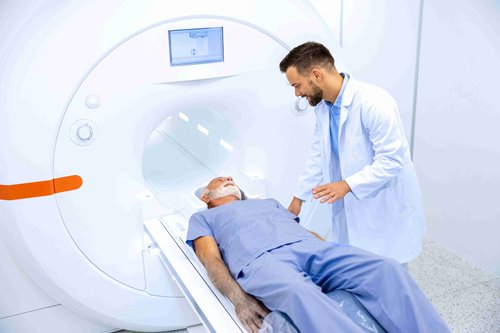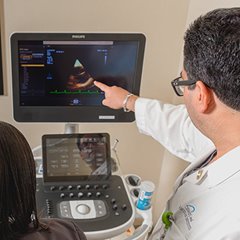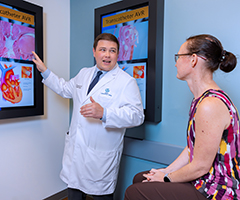Cardiac Magnetic Resonance Imaging (MRI)
Cardiac MRI: A Noninvasive Heart Imaging
A cardiac magnetic resonance imaging or MRI, is a safe and painless medical scan that uses a strong magnetic field and radio waves to create detailed images of your heart and blood vessels. This diagnostic tool offers valuable insights into your heart's condition and blood flow.
What can a cardiac MRI show?
Cardiac MRIs are usually recommended when you have more complex heart issues, often following initial tests like echocardiogram. This special MRI assesses blood vessels, measures how well your heart pumps, and checks your heart's function. It helps in diagnosing various heart conditions, including:
- Detecting damage from a heart attack.
- Checking blood flow in the heart muscle to understand if artery blockages cause chest pain (angina).
- Identifying inflammation in the middle layer of your heart wall (myocardium).
- Revealing issues in the main heart artery, such as tears, bulges (aneurysms), or narrowing.
- Assessing conditions that affect the outer heart lining, like pericardium disorders.
- Diagnosing heart muscle diseases such as cardiomyopathies, heart failure, and cardiac tumors.
- Evaluating heart valve disorders, like regurgitation and stenosis.
- Congenital heart problems and how well surgical repairs have worked.
Cardiac MRI Safety and Preparation
Cardiac MRIs are generally safe and well-tolerated. However, people with certain metal devices in their bodies, like pacemakers or cochlear implants, should avoid these scans unless their device is MRI conditional. Special contrast dye may be used, but individuals with advanced kidney issues may need to be cautious.
To prepare, avoid wearing objects with metal or electronics, like watches or earrings, and consult with your healthcare team if you have implants or kidney concerns.

During the MRI, you'll lie on a table that slides into a machine that looks like a tunnel. It's important to remain still, and a radiologist or technologist will monitor the process from another room. The MRI machine creates a magnetic field and uses radio waves to take images. If necessary, a contrast agent may be injected to make the images clearer.
After the MRI, you can usually resume your regular activities. If a sedative is used, you may need someone to drive you home, and the radiologist will review the images and share the results with your healthcare team for further discussion.
Explore Our Cardiac Imaging Services
Lee Health Heart Institute invites you to learn more about cardiac imaging! The cardiac imaging procedures offered at Lee Health allow our providers to see the heart's function, structure, and blood flow, aiding in diagnosing and treating cardiovascular conditions for our patients.
-
Cardiac Imaging
Lee Health Heart Institute offers advanced cardiac services that utilize cutting-edge AI imaging technology. Our expert team provides accurate and efficient diagnostic evaluations for comprehensive cardiac care. Contact us today!
Ready to Schedule an Appointment?
Take advantage of the latest technology in cardiovascular diagnostics by scheduling your cardiac imaging the Lee Health Heart Institute. Our commitment to personalized patient care ensures that you receive the most accurate and reliable heart assessment.
-
Cardiology - Heart Institute at Bass Road
-
Cardiology - Heart Institute at Cape Coral Hospital
-
Cardiology - Heart Institute at Coconut Point
-
Cardiology - Heart Institute at Medical Plaza One
-
Cardiology - Heart Institute at Metro Parkway
-
Cardiology - Heart Institute at Sanctuary



